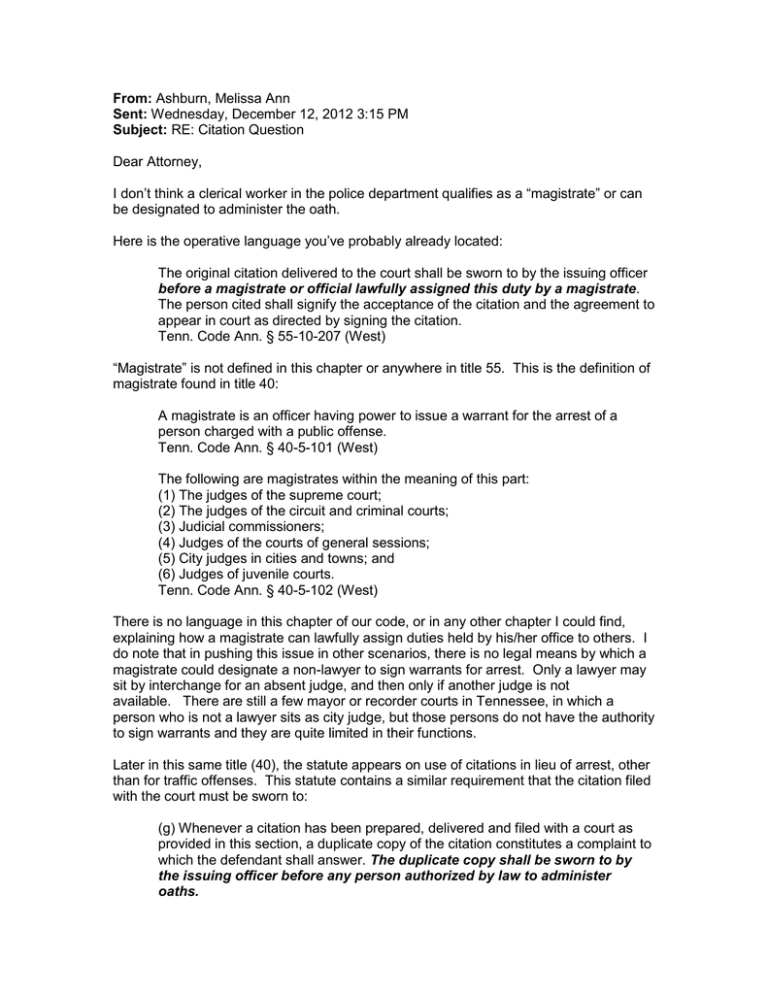From: Sent: Subject:
advertisement

From: Ashburn, Melissa Ann Sent: Wednesday, December 12, 2012 3:15 PM Subject: RE: Citation Question Dear Attorney, I don’t think a clerical worker in the police department qualifies as a “magistrate” or can be designated to administer the oath. Here is the operative language you’ve probably already located: The original citation delivered to the court shall be sworn to by the issuing officer before a magistrate or official lawfully assigned this duty by a magistrate. The person cited shall signify the acceptance of the citation and the agreement to appear in court as directed by signing the citation. Tenn. Code Ann. § 55-10-207 (West) “Magistrate” is not defined in this chapter or anywhere in title 55. This is the definition of magistrate found in title 40: A magistrate is an officer having power to issue a warrant for the arrest of a person charged with a public offense. Tenn. Code Ann. § 40-5-101 (West) The following are magistrates within the meaning of this part: (1) The judges of the supreme court; (2) The judges of the circuit and criminal courts; (3) Judicial commissioners; (4) Judges of the courts of general sessions; (5) City judges in cities and towns; and (6) Judges of juvenile courts. Tenn. Code Ann. § 40-5-102 (West) There is no language in this chapter of our code, or in any other chapter I could find, explaining how a magistrate can lawfully assign duties held by his/her office to others. I do note that in pushing this issue in other scenarios, there is no legal means by which a magistrate could designate a non-lawyer to sign warrants for arrest. Only a lawyer may sit by interchange for an absent judge, and then only if another judge is not available. There are still a few mayor or recorder courts in Tennessee, in which a person who is not a lawyer sits as city judge, but those persons do not have the authority to sign warrants and they are quite limited in their functions. Later in this same title (40), the statute appears on use of citations in lieu of arrest, other than for traffic offenses. This statute contains a similar requirement that the citation filed with the court must be sworn to: (g) Whenever a citation has been prepared, delivered and filed with a court as provided in this section, a duplicate copy of the citation constitutes a complaint to which the defendant shall answer. The duplicate copy shall be sworn to by the issuing officer before any person authorized by law to administer oaths. Tenn. Code Ann. § 40-7-118 (West) We are frequently asked at MTAS who has the authority to swear officials in or to administer oaths of office. In our opinion, state court judges and state court clerks are authorized to administer oaths and we recommend that these state officers be used when swearing in elected officials. (Although a city judge can administer oaths for testimony, we are not convinced they can administer oaths of office for elected officials, but this is a side issue) In addition, this statute contains the following statement about city court judges being magistrates: “Magistrate” means any state judicial officer, including the judge of a municipal court, having original trial jurisdiction over misdemeanors or felonies Tenn. Code Ann. § 40-7-118 (West) However, T.C.A. 40-7-118 is a criminal procedure statute, and it clearly exempts traffic offenses from application. But it is instructive on the use of the term “magistrate” in T.C.A. 55-10-207. Based on these statutory provisions, and the requirement appearing in T.C.A. 55-10207, in my opinion a clerk in the police department cannot be the person before whom these citations are sworn to by the officer. It should rather be the city judge. I do not know how a judge can “lawfully assign” this duty to a clerk, but perhaps the statute refers to those who sit by interchange for judges in their absence. I also suspect this statute refers to elected state court clerks, who do have the power to administer oaths. I do think the requirements of T.C.A. 55-10-207 should be followed by city courts, even though the offense is not “criminal” and is not being sent up to general sessions. Since the offenses are ultimately reported to the Dept. of Safety, the punishment for traffic offenses is controlled by these statutes, and it is from these statutes that city courts have the authority to even try these offenses, in my opinion T.C.A. 55-10-207 does apply to citations in city courts. I suspect this issue has not come up often in city courts as the ticket cost is far less than attorney fees. If a city is challenged for failure to abide by the statutory requirements, I predict the city would lose that case. I hope this helps, Melissa A. Ashburn Legal Consultant University of Tennessee Institute for Public Service Municipal Technical Advisory Service (865)974-0411
